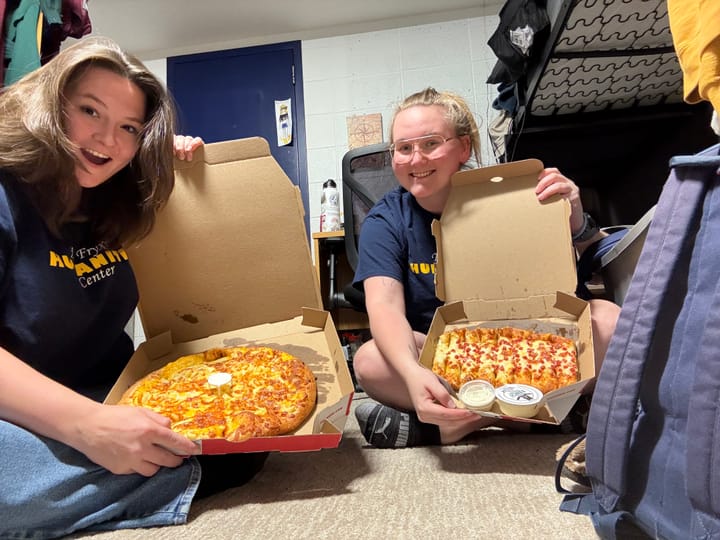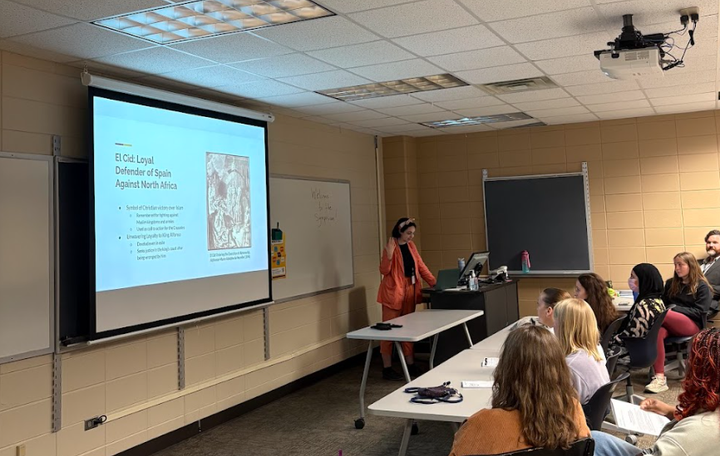Freshman cellist plays with South Dakota Symphony
Freshman Anabelle Lecy practices the cello. Photo by Keeley Meier.
While most freshmen spend their afternoons and weekends exploring their newfound freedom, Annabelle Lecy is partial to spending time in a practice room in the basement of Humanities.
Because of this, Lecy (who goes by Anni) is already an accomplished cellist at the age of 19. Her journey with the cello began when she was just seven years old.
Sitting with her legs crossed, cozy in a light gray Augustana University Orchestra sweatshirt, Lecy recounts how the cello has brought her to Augustana with a glowing smile.
“After my sister started playing the violin, she wanted to have someone to play with all the time, so she wanted me to play cello,” said Lecy.
Lecy started with private lessons before joining her elementary school’s orchestra, which let her in one year early due to her advanced playing abilities. From there, her musical career took off.
Lecy attended Minnesota All State for orchestra in grades six, seven and eight at the middle-school level. She also played in grades nine, ten and eleven at the high-school level. From 2011-2018, she played with the Southwest Minnesota Orchestra.
She then started her journey at Augustana last fall as part of the orchestra, the string quartet and one of three students to play in the competitive Concerto-Aria concert at the Washington Pavilion.
However, Lecy’s biggest accomplishment, and the one she is most proud of, is getting to play as a substitute for the South Dakota Symphony.
With her delicate features and a rose-gold cello case that is almost as big as her, Lecy owes her success to her serious work ethic.

Her friend and fellow music major, sophomore Caleb Timmerman, recognizes this as one of Lecy’s defining qualities.
“My favorite and least favorite thing about Anni is how hard she works,” Timmerman said. “She is down in the practice rooms hours a day. She makes everyone else look awful because she’s so amazing.”
Lecy says she practices anywhere from two to five hours each day, usually in practice room 38 in the Humanities building. The days she practices five hours are the ones where she simply gets caught up in the music.
“A lot of times it just happens, when I’m down there working on something. I feel like time goes faster when I’m practicing,” Lecy said.
As much as Lecy enjoys spending her time in an antiquated practice room equipped with a piano, a hard chair on which she perches at the edge and a metal, black music stand, Lecy does not feel the same about performing.
“I do get really nervous before I perform. I try not to look at the audience, and I just try to focus on what I’m doing, but it’s hard not to get distracted when there’s people watching and you know they’re watching. It’s like a big mental game.”
While playing, Lecy focuses more on the cello than on the sheet music in front of her. She keeps
her legs bent, uses her whole body to make fluid motions and keeps a strong grip both on the bow and the cello itself.Lecy’s face gives nothing away about the nature of the piece except for slight smiles during the difficult parts. Her stature is small but commanding in a way that makes you lean in closer to hear the secrets of her cello. She uses her bow to slice through the strings which vibrate so intensely yet appear completely still. The tone of the cello is both rich and pleasantly piercing.
Because of its resemblance to the human voice, the cello can portray emotion in a way that not all instruments can. This is why Lecy prefers to play sad pieces because, as she says, “I feel like I can put more emotion into it.”
Lecy’s current plan is to graduate in two years and go on to study at the graduate level. Lecy does not yet have a fully developed dream but thinks she would like to travel and play chamber music. She also hopes to visit China someday, the country she was adopted from, once she has reached her ideal playing level.
“I feel like [the best] is still yet to come,” said Lecy.



